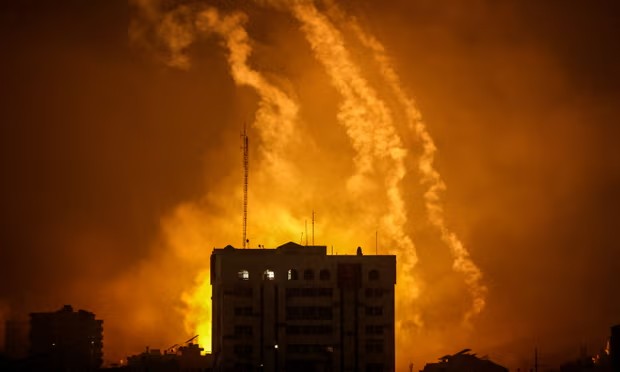Palestinians, aid groups, journalists and civil society organisations have said they have lost touch with staff and families in Gaza, after Israel knocked out internet and communications, cutting off the territory’s residents from contact with the outside world.
NetBlocks, a watchdog organisation that monitors cybersecurity and the internet, reported a collapse in connectivity in the Gaza Strip late on Friday.
The Palestinian telecom provider, Paltel, said the bombardment caused “complete disruption” of internet, cellular and landline services.
Shortly after reports of lost service, exceptionally heavy bombardment was heard in the territory and the Israel Defense Forces said their air and ground forces were intensifying their attacks in Gaza.
Already in darkness after most electricity was cut off and fuel for generators ran out, Gaza’s 2.3 million people were thrown into isolation from the rest of the world.
Explosions from continuous airstrikes lit up the sky over Gaza City for hours, but the communications cutoff meant that the number of casualties from strikes and details of ground incursions could not immediately be known.
Al-Jazeera correspondent Tareq Abu Azzoum reported on the ground that Palestinians are “isolated in the territory” without “any access to the networks” at present.
Palestinians outside of Gaza have been unable to reach their relatives. The poet and author Mohammed El-Kurd, tweeted: “No one I know in Gaza is answering my texts.”
The Committee to Protect Journalists expressed alarm, saying the world “is losing a window into the reality” of the conflict. It warned that the information vacuum “can be filled with deadly propaganda, dis- and misinformation”.
The loss of communication dealt a further blow to a medical and aid system which was already on the brink of collapse under Israel’s three-week siege.
Lynn Hastings, the UN humanitarian coordinator for Palestine, tweeted that without phone lines and internet, hospitals and aid operations would be unable to operate. “Wars have rules. Civilians must be protected,” she said.
Relief agencies and human rights groups including Unicef, ICRC, Médecins Sans Frontières and Amnesty also said they had lost all contact with their staff in the embattled territory.
The Palestinian Red Crescent Society, said in a statement that they had “completely lost contact with operation rooms due to the Israeli authorities cutting off all landline, cellular and internet communications”.
They added: “We are deeply concerned about the ability of our teams to continue providing their emergency medical services, especially since this disruption affects the central emergency number 101 and hinders the arrival of ambulance vehicles to the wounded and injured.”
In a statement, Tedros Adhanom Ghebreyesus, the director-general of World Health Organisation (WHO) said: “We have lost touch with our staff in Gaza, with health facilities, health workers and the rest of our humanitarian partners on the ground. This siege makes me gravely concerned for their safety and the immediate health risks of vulnerable patients.”
Erika Guevara-Rosas, senior director of research, advocacy, policy and campaigns at Amnesty International, said: “At Amnesty International we have lost contact with our colleagues in Gaza and other human rights organizations have found it increasingly challenging to document violations due to the intensity of Israel’s attacks and restrictions on communications.
“This communications blackout means that it will be even more difficult to obtain critical information and evidence about human rights violations and war crimes being committed against Palestinian civilians in Gaza, and to hear directly from those experiencing the violations.”
Guevara-Rosas added: “Internet and telecommunications infrastructure must also be restored as a matter of urgency, to allow rescue operations amidst Israeli pounding airstrikes and expanding ground operations.”
Source: The Guardian



Recent Comments